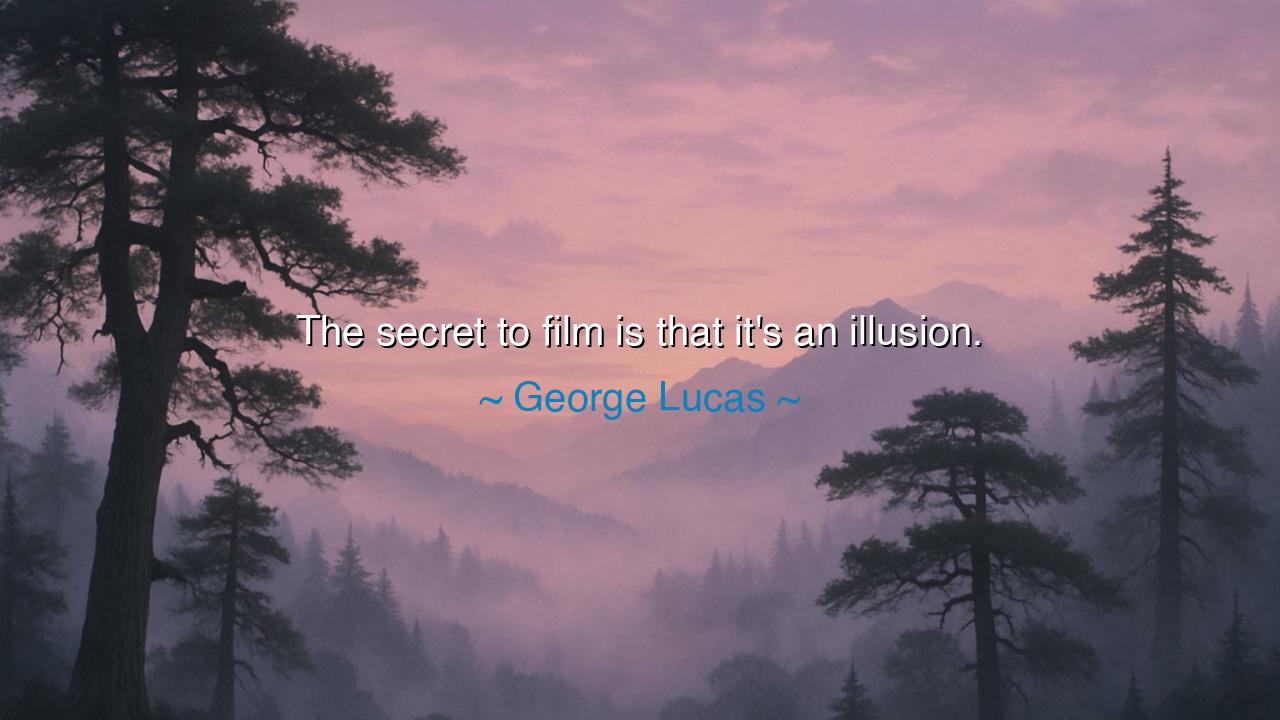
The secret to film is that it's an illusion.






"The secret to film is that it's an illusion." These words from George Lucas capture a profound and timeless truth about the very nature of cinema. In essence, Lucas is revealing that film, like all great art, operates on the principle of illusion—creating a world that seems real, yet is entirely fabricated. From the first flickers of light on a screen to the complex narratives and emotional landscapes that films construct, cinema is an art form built on trickery and perception. The illusion of film, then, is not something to be dismissed as a falsehood, but something that speaks to the magic of storytelling and the power of imagination. In this, it becomes a mirror for the human condition itself, one in which we continually craft illusions—about ourselves, our world, and our purpose.
In the same vein, the ancient Greeks understood the power of illusion in art. The theater in ancient Greece was not merely about presenting the world as it was, but about transforming reality into something deeper, something more meaningful. Sophocles, Euripides, and Aeschylus created stories that reflected the human soul—tales of love, tragedy, and redemption that were not bound by the constraints of everyday life. The illusion of the stage allowed the audience to witness heroic struggles and divine interventions, yet these stories were deeply connected to the truth of human existence. Theater, like film, was not about presenting a literal reality, but rather an elevated vision of life that illuminated the follies, virtues, and complexities of the human spirit.
Film, as Lucas suggests, works in much the same way. It is crafted reality—a constructed illusion that invites the audience to suspend disbelief and immerse themselves in a world that, while not real, speaks to universal truths. Think of the groundbreaking work of Walt Disney, who, through the invention of animated films, created whole universes where characters could sing, dance, and experience emotions in ways that felt authentic despite their fantastical nature. Mickey Mouse, in his humble beginnings, was an illusion—a product of animation, yet he became a cultural icon because the stories he represented tapped into something deeply human: joy, courage, friendship, and the desire to overcome adversity. Film allows us to live in worlds beyond the mundane, while also revealing something about ourselves through the emotional journeys of characters.
However, Lucas's insight on illusion also hints at something more philosophical—our own existence and the ways in which we create illusions in our own lives. Plato’s Allegory of the Cave presents the idea that humanity is trapped in a world of shadows, mistaking illusion for reality. Much like the prisoners in the cave who only see the shadows on the wall, we too often believe the illusions we see and experience are the truth. Yet, the deeper truths of our existence—the spiritual, emotional, and intellectual dimensions of life—are often hidden behind the shadows. The illusion of film, like the shadows on the wall of Plato’s cave, offers us a glimpse into deeper truths—it allows us to confront the abstract and complex aspects of life in a way that is palpable and understandable.
Take, for instance, the enduring impact of Star Wars, Lucas’s visionary saga. At its surface, it is a tale of space battles and heroic quests, yet underneath, it grapples with profound questions of identity, destiny, and morality. The illusion of this faraway galaxy allows viewers to reflect on their own personal struggles—whether against the forces of evil, the burdens of family legacy, or the journey toward self-realization. The brilliance of Lucas’s storytelling is that the illusion of Star Wars mirrors the realities of human existence, guiding us to question who we are, what we stand for, and what forces shape our world.
The lesson in Lucas’s words is multifaceted. First, it teaches us that art—whether through film, literature, or performance—is built on the foundation of illusion. These illusions, however, are not merely empty creations; they serve as a mirror for our lives, allowing us to explore and understand the truths of the human condition. Just as Plato recognized the power of allegory, we too must embrace the idea that the illusions we create—whether in art or in life—are a way to unveil deeper meaning. We must ask ourselves: How can the illusions we create serve to illuminate rather than obscure? How can the stories we tell—whether through cinema or in our daily lives—reveal the truths we may not yet fully understand?
In practical terms, Lucas’s perspective urges us to engage with art—not merely to consume it, but to question it, to allow it to provoke thought and reflection. Whether watching a film, reading a book, or contemplating a work of art, we must not simply accept the illusion at face value. We must ask, "What truths does this illusion reveal about the world and my place in it?" By doing so, we allow ourselves to see beyond the surface and discover deeper meanings that enrich our lives and shape our understanding of the world. The power of film is in its ability to transport us, but its real value is in its capacity to help us see the truths of our own journey, transforming us through the illusions it presents.
Thus, George Lucas's insight about film is not just about the craft of cinema but about the nature of all art—its ability to create illusions that reveal deeper truths. Let us carry this understanding into our own creative endeavors and our own lives, remembering that through illusion, we may uncover the authenticity of our existence.






AAdministratorAdministrator
Welcome, honored guests. Please leave a comment, we will respond soon